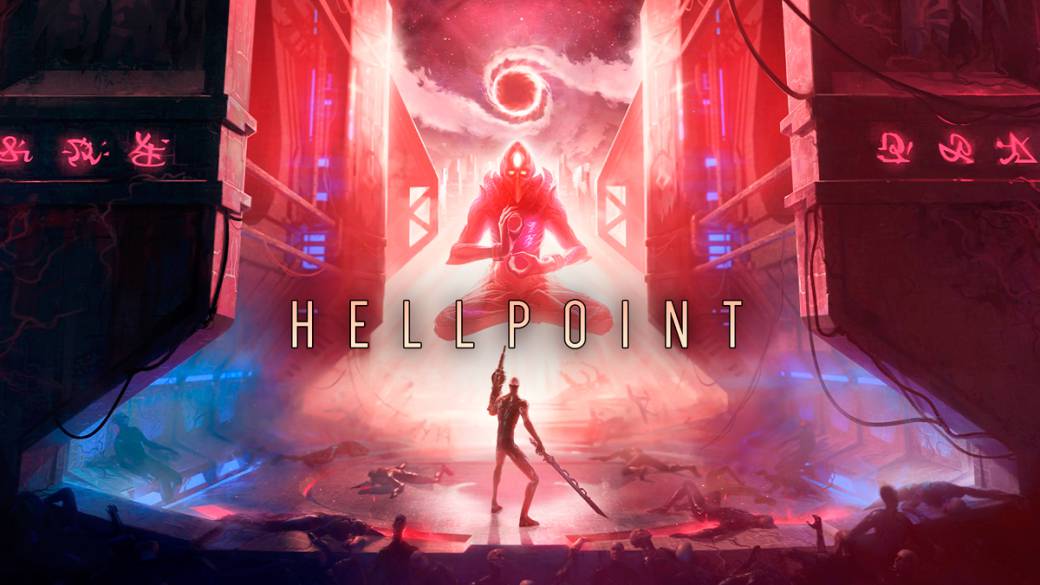
Another game is closing in on From Software’s dark throne, already close to becoming a genre unto itself, will it triumph?
The one who writes these lines does not like karaoke. Especially when the typical pretentious man takes the stage ready to “nail” the song, imitating every last detail of the original, including even the gestures and nuances of the voice of its interpreter. No matter how hard that fan tries, as a musical show, it always leaves much to be desired. Quality is lacking, soul is lacking, originality is lacking and, to be honest, when it comes to a song that you love, rather than enjoying its performance, you only look at the shortcomings that keep it from it.
It is a sensation that is repeated in the plethora of “Soulslike” that today fill the shelves. Titles inspired by the Dark Souls franchise, from From Software, with results ranging from acceptable to shameful. The case that concerns us today, Hellpoint, is one more in that series that “pays homage” to the classic. Let’s see how well they interpret it.
The shortest description would be that of a “space Dark Souls”. Only with this premise we can already dominate the game from the first second, since we know the mechanics of attack, dodge and blocking, the importance of collecting souls (axions), the security provided by bonfires (gaps), the essential balance between health, strength and energy, the danger posed by even the smallest enemy, or the relief of recovering lost souls when we die, as long as we manage to immediately reach the point on the map where we have fallen.
The Canadians of Cradle Games, an indie studio of which this Hellpoint is their cover letter after launching it as a “kickstarter” three years ago, do not try to hide the references to the Souls saga, trying to keep the best of it while trying to add some your personal style. In that respect, the futuristic spatial setting is the greatest differentiation. This location, however, becomes anecdotal when we verify that the story, full of cryptic messages and a lot of metaphysics, could well take place in a castle and its catacombs, instead of in a special season. The enemies, armor, attacks … are based on swords, axes, maces … replacing the classic bows and arrows with laser weapons, yes.
The stage, with its spatial setting, only gets an excuse to introduce an elevator, artificial lighting or windows that show a nearby black hole, a vertex around which the whole story revolves. The choice of a space station, of course, greatly facilitates the work of drawing and texturing scenarios, in addition to allowing a verticality in the routes that we do not observe in the honored saga. Against this map it must be said that it does not have any coherence; It does not show rooms that tell us that we are indeed traveling through a spaceship, but generic spaces abound that completely ignore the story to focus on being a good combat environment.
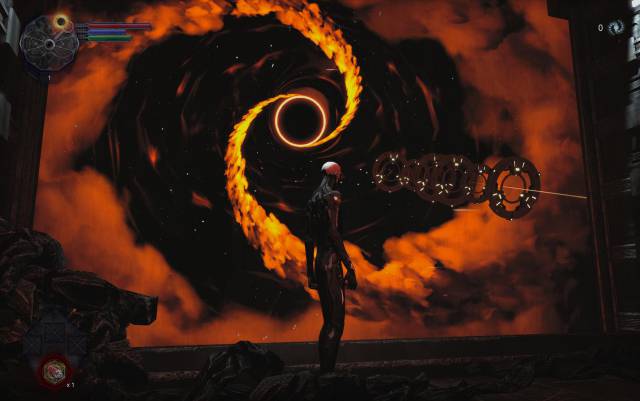
Technically, the graphics look out of date, like a few years too many. The design of the characters, although it does not fit at all in a spatial environment, is correct in the distance, although it is poor in detail. As for the environment, here the setting of a space station does prove to be a success, because it allows the abuse of smooth walls, with a minimum need for textures. On the other hand, the title has an obvious problem with lighting, with an abuse of lightmaps that ends up drawing attention precisely because of how the characters project their shadow or not.
Regarding sound, the lack of music, except in specific moments, helps to get into a situation and to be aware of the sounds that hidden enemies may produce. A curious note about this section is that our character makes a lot of noise when walking, correctly including the effects of the armor that we carry, but surprisingly, it becomes completely silent when running …
If we talk about the main element of the game, combat, it is reminiscent of the first Souls, being somewhat rough, not very polished, but effective. Enemies do damage, a lot, but they are not so dangerous. Their attack patterns are very predictable and, although the classic “parry” is not allowed, they are easy to dodge and eliminate, as long as we manage to face them one by one. Something simple since the AI of these enemies sometimes allows them to see us from the other side of the stage, but does not detect us when we finish with one of their companions immediately next to them.
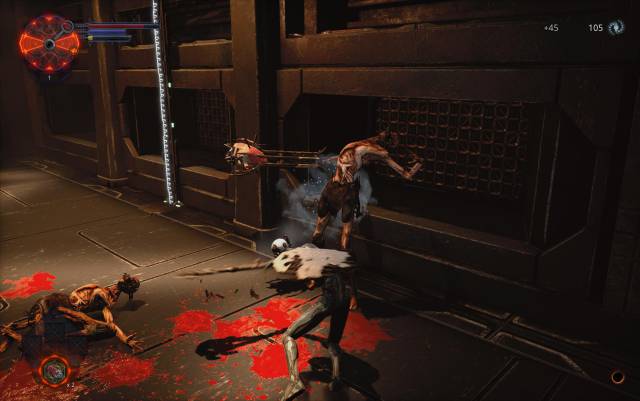
To increase the challenge, the developers introduce events outside the script, such as the punctual attack of hordes of enemies that overwhelm the player or the appearance of a ghost, an exact copy of the player at the time of his death, which will make it difficult for you to recover the axions (souls) lost by falling. These less encrypted elements end up showing the weaknesses of the title, since we end up getting used to the fact that the best way to end our ghost is to wait for it to get hooked somewhere on the map where we can hit it without any opposition.
Something similar happens with the final enemies that, of course as in the Souls, mark the passage to a new scenario. These enemies lack identity, personal background, or significance in history. They are simply more difficult enemies to eliminate. Or at least that’s until we learn where on the map they get hooked and we can kill them at will.
It is these kinds of circumstances that lead us to raise our eyebrows and become skeptical of the rest of what we have to play. The approach is the good one, because it is based on proven success; make the character grow, balance his strengths and weaknesses, bet on a melee combat or another one based on magic? But as we progress through the game, we feel how all the pieces of that puzzle that we have been collecting for hours do not quite fit together.
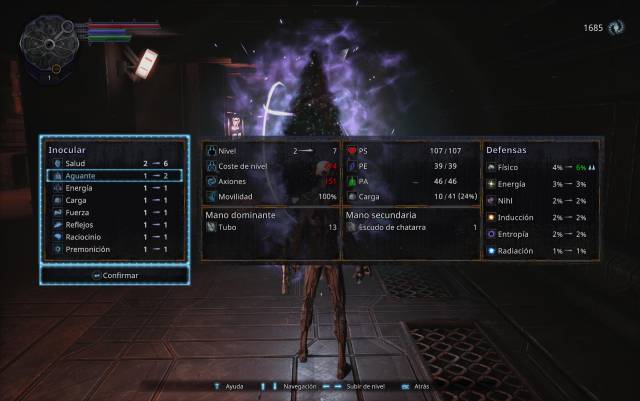
The possibilities of the character regarding firearms and magic come at a time when we already have the character focused on melee combat, because that is what forces us throughout the first part of the game. The story, as much as we want to pay attention to it, loses all its interest by dint of being so cryptic that it is almost ridiculous. The scenarios are no longer worth exploring in depth because they never hide something really essential and it does not make up for the time lost by gambling to die from a fall resulting from a debatable jump system and collisions.
Even the improvement of weapons and “crafting”, also touched on in the game, lose their interest when there must be some kind of bug that causes objects to disappear from your inventory. The game ends up being long, somewhat tedious, repetitive. And it is not that it is in itself … it is the feeling that it does not offer us enough reward to reward us with how much we are working on it and the long time we have to dedicate to it.
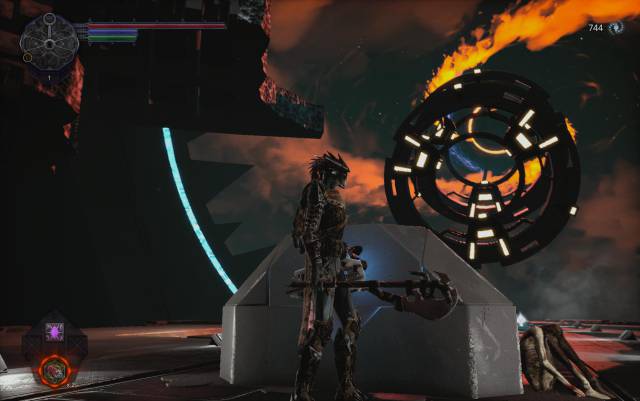
Hellpoint offers cooperative gameplay possibilities, also emulating the invasion of another player on our game or the messages left on the map between different players. It even has the possibility of a split screen cooperative. We have not tried these options, basically because the development of the game itself does not exactly invite the cooperative, except for specific moments such as a final boss.
CONCLUSION
It is said that the Souls saga is typical of masochists; players with a lot of patience, perseverance and resistance to discouragement. But a game can demand that of us when it is up to the task too. And this Hellpoint is not. It is a correct game, something that we do not discuss, even fun, but it is doomed to get lost in a no man’s land among those players of the original Souls, for whom the experience will be unrewarding, boring … and players who are unaware of that saga and They also don’t have to look at this title when they have the “original” to enjoy and dozens of other titles that also imitate it. Only the most fanatical of this style of game, those who feel that withdrawal syndrome that From Software games leave when we finally finish them, can try to mitigate it by putting hours into this substitute.
THE BEST
- A sip of water for those thirsty for Souls
- Endless possibilities to grow the character
- Still a difficult challenge
WORST
- It does not contribute anything with respect to the original saga
- Technically fair, with a bug that ruins the gaming experience
- It ends up being boring, for being a challenge without reward
Right
It is not the latest or the most original, it does not have the best execution either, but it can be fun if you like the genre. Good, but could be improved.
